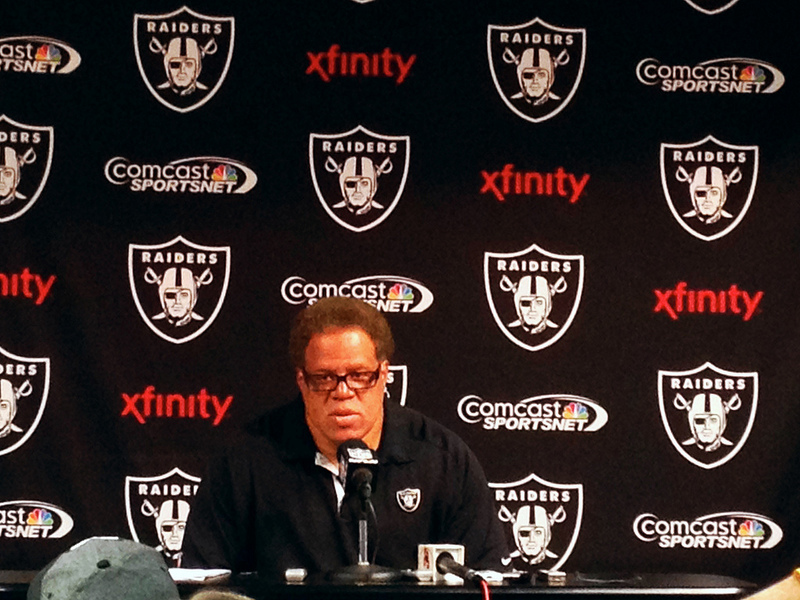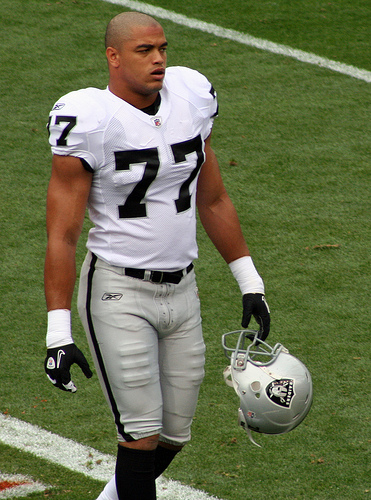Evaluating Reggie McKenzie And The State Of The Oakland Raiders

It was hardly a surprise that Cable's replacement, Hue Jackson, was fired the next year by Al Davis’ surviving son Mark. Soon after, a new regime took control for the first time since 1972. General manager Reggie McKenzie was hired from the Green Bay Packers' executive tree and head coach Dennis Allen was subsequently chosen to lead the new-image Raiders into the future.
---
One full season into this rebuilding process, and where do the Raiders stand now? McKenzie sent a clear message with the termination of the team's obscenely large contracts. He cut guys like Darius Heyward-Bey, Stanford Routt and Rolando McClain, then traded away Carson Palmer for a ham sandwich and box of Altoids.
In his 21 months at the helm, McKenzie has turned what was usually up-to-the-cap-limit spending into over $8 million in cap room this year, with surely even more space next year as more of the Raiders' old contracts and dead money come off the books. But in terms of the talent on the Raiders roster, not much progress has been made thus far into the regime.
Where have they gotten better? Let’s start off by taking a look at the defensive line, the defensive position group with the most impact on the defense as a whole. If a team’s defensive line is able to create consistent pressure on the opposition’s quarterback, it helps the secondary because they won’t have to cover for as long. And on the flip side, if a team’s defensive line is terrible and leaves the quarterback with all day to throw, no secondary on the planet can cover NFL receivers for more than a few seconds.
Guess which category the Oakland Raiders’ defensive front falls into? It’s bad. And the sad part is, they actually had some very talented players within the front four last season. The failure to retain Matt Shaughnessy, Desmond Bryant, Richard Seymour and Tommy Kelly (average age of 29.5 and 118.5 total career sacks between the four) is significant and disappointing to say the least. One bright spot is defensive end Lamarr Houston, who is, thankfully for the Raiders, still on the roster. Houston is versatile and looks like a star in the making. Unfortunately for Oakland, 2013 is Houston’s final year under contract and they will likely have to commit big dollars if they want to keep him beyond that. And if we have learned anything from how the Raiders handled their defensive linemen last offseason, it looks as if that won’t happen.
It's understandable that the Raiders, in their strapped cap situation at the time, were uncomfortable spending a lot of money to keep players like Desmond Bryant and Richard Seymour, the former of whom signed a $34 million contract with the Browns and the latter of whom is still unemployed because he is demanding far above his market value. But the aforementioned Shaughnessy signed only a one-year, $1 million deal with the Arizona Cardinals. Could the Raiders really not have afforded that for a defensive lineman who would be the second-best on their roster right now? Or matched the offer for defensive tackle Tommy Kelly, who signed a two-year, $5 million deal with the Patriots (but with only $1 million guaranteed)? Especially considering that they traded for Matt Flynn and then for no apparent reason converted his entire salary for 2013 into guaranteed money. That's a total of $6.5 million by the way. Or when they signed both cornerbacks Mike Jenkins and Tracy Porter to one-year deals worth more than Shaughnessy’s. A good defensive line solves a lot of problems for a defense, and the Raiders’ apparent lack of commitment to finding talent for their front four is astounding and inadvisable.
So if they didn’t spend significant resources on the defensive line, what exactly are the Oakland Raiders prioritizing? Besides quarterback (saving that discussion for later), it seems as though kicker is one of the positions of most critical importance to a rebuilding team. It must be, or else the Raiders wouldn’t have signed Sebastian Janikowski to a five year, $18.9 million deal in the offseason. Instead of giving money to a solid defensive lineman or much-needed depth on the offensive line who would probably start multiple games this year, McKenzie decided that a kicker is most worthy of their financial resources. And that $3.78 million-per-year average is a lot of money for anyone. But for a kicker? Wow.
It was also apparently decided that the defensive secondary was to be prioritized in the offseason. But the effectiveness to which the Raiders executed this strategy is questionable, to say the least. They made three “band-aid” type moves of note, which is basically to say that they signed players who will help mask a weakness only in the short-term. These band-aid moves include signing cornerbacks Tracy Porter and Mike Jenkins as well as safety Charles Woodson all to one-year deals. These moves don't seem conducive to improving the state of the Raiders beyond the present, which is all that really matters since there’s no way Oakland will even sniff playoff contention this year.

As far as the offense goes, it’s slightly better. But not by much. The Raiders lucked out with a few good wide receivers when they selected Denarius Moore in the fifth round, Jacoby Ford in the fourth round and acquired Rod Streater as an undrafted free agent. The front office deserves credit for those additions, even though Ford was chosen under the previous regime. But Carson Palmer's safety blanket and last year’s team leader in receptions, tight end Brandon Myers, was let go in free agency.
The offensive line has some potential, but also more than its fair share of holes as well. Signing zone-blocking specialist offensive guard Mike Brisiel to a five-year, $20 million deal a year ago looks especially dumb now after a subpar year and the firing of zone-blocking scheme implementer and offensive coordinator Greg Knapp. So in other words, Brisiel was signed because of his prowess within the zone blocking scheme, and Oakland doesn’t even primarily run said scheme anymore. So now Brisiel is an overpaid, undersized guard for the power scheme the Raiders will try to implement this year.
On the bright side, center Stephen Wisniewski is coming off of a more-than-solid second year and looks to be a staple of the offensive line for years to come. Left tackle Jared Veldheer also looked like an up-and-comer until he injured his triceps during the preseason, and he will unfortunately be forced to miss the majority of the season. In Veldheer’s place at left tackle, however, rookie lineman Menelik Watson from Florida St. played and looks like the starter over Alex Barron, who continues to play terribly. Still, it would have been nice to see McKenzie and company make a more concerted effort to improve the offensive line and make life at least a little bit easier for whoever will be starting at quarterback.
Speaking of which, the time has come to talk about the most mismanaged quarterback situation in the entire NFL. Well, except for maybe the New York Jets.
Not only did McKenzie trade away a couple of mid-round picks (picks the Raiders have used in the past to draft players like Veldheer, Moore and Ford) to acquire Matt Flynn from the Seattle Seahawks, a player McKenzie supposedly knew well from their coinciding time in Green Bay together, but McKenzie also converted part of Flynn's base salary to guaranteed money for no apparent reason. In fact, it seems as if, by unnecessarily giving Flynn this guaranteed money, the Raiders were saying that he is ‘their guy’ before he even actually won the job. And now, after a relatively underwhelming preseason performance by Flynn, Terrelle Pryor was named the team's starting quarterback for Week 1.
But hold on, we’re not done.
Also in an effort to improve the quarterback position, the Raiders drafted strong-armed quarterback Tyler Wilson out of Arkansas in the fourth round of last April’s draft. He got almost $500,000 in signing bonuses. And guess what happened? The Raiders cut him. That’s right. Wilson is a young, physically talented player at unquestionably the most important position in football. And the Raiders cut him before he was even on their roster for one regular season game.
For a team like the Seahawks, the 49ers, or the Broncos, cutting a fourth-round pick is more acceptable because of the depth that each of these teams have. But for the Raiders, who have one of the worst overall rosters in the NFL, it's hard to justify cutting a fourth round pick with that kind of upside and importance.
The Raiders' quarterback situation is a disaster. They have Terrelle Pryor, of course, but he is very raw and hasn’t been consistent enough to inspire confidence in him as the quarterback of the future, either. Pryor is now the starter, but it looks like the Raiders will have to go another year before they take another crack at finding the right guy to lead their franchise. But you know what? Even if they did have a quarterback of the future, I'm not sure if they would even know it. The supporting system that exists offensively for any potential quarterback right now is pretty dreadful, and instead of trying to improve it, McKenzie passed on the opportunity to sign another offensive weapon or lineman in order to acquire three washed-up defensive backs. The fact that Pryor has impressed the most in the quarterback competition isn't shocking, because the athleticism and instant-offense he brings enables him to overcome to vast deficiencies in the rest of the offense. Matt Flynn or Matt McGloin can't do that.
Yes, Reggie McKenzie has doctored the salary cap situation back to almost full normality. But unfortunately for him, the team’s on-field play has not followed suit, largely because he has incorrectly prioritized free agency spending. This is a major reason why the Raiders will once again be horrendous this year, with anything more than four wins being a surprise. Owner Mark Davis will have to be patient with McKenzie as he prioritizes the team and finds a quarterback for the future. But for now, as always, the Oakland Raiders are in a black hole.
Reach Staff Writer Andrew McKagan here or follow him on Twitter.



